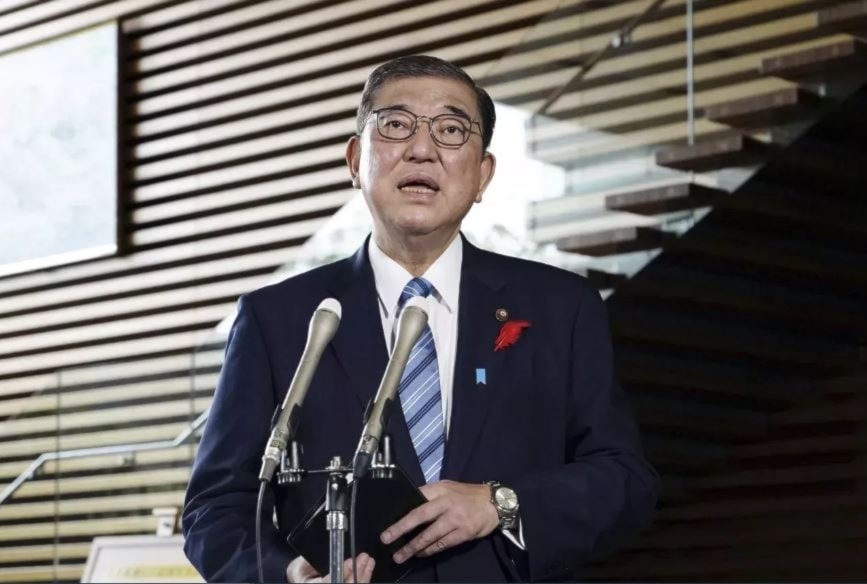Japan's PM faces storm after electoral setback
A notable victor from the election has been the opposition Constitutional Democratic Party (CDP), led by former premier Yoshihiko Noda, which is projected to increase its seat count to 148 from 96 in the last election.
-

Japanese Prime Minister Shigeru Ishiba speaks in Tokyo on October 7. (AP)
Japanese Prime Minister Shigeru Ishiba faced the threat of minority rule after his snap election gamble, which resulted in the ruling party's worst outcome in 15 years.
Ishiba, 67, called the election just days after assuming office on October 1, but voters, frustrated by a slush fund scandal, punished his Liberal Democratic Party (LDP), which has been in power almost continuously since 1955.
"We are receiving severe judgment," Ishiba stated late Sunday, as somber expressions were captured at the LDP headquarters. He acknowledged that the Japanese public "expressed their strong desire for the LDP to do some reflection and become a party that will act in line with the people's will."
The big picture
As the results came in, the yen plummeted to a three-month low, dropping over one percent against the dollar. Preliminary reports from NHK and other media indicated that the LDP and its junior coalition partner Komeito faced their worst results in 15 years, with the LDP projected to win only 191 seats—down from 259 in the 2021 election—while Komeito secured 24 seats. Official results are expected later Monday.
Media speculation ahead of the election suggested that if the LDP performed poorly, Ishiba could resign, potentially becoming the shortest-serving prime minister in post-war Japan. On Monday, the LDP’s election committee chief, Shinjiro Koizumi, son of former premier Junichiro Koizumi, stepped down.
Ishiba’s most likely path forward appears to be forming a minority government, as analysts believe the divided opposition may struggle to create a coalition.
"Lawmakers aligned with (former prime minister Shinzo) Abe were cold-shouldered under Ishiba, so they could potentially pounce on the opportunity to take their revenge," noted Yu Uchiyama, a political science professor at the University of Tokyo.
However, he added, "with the number of LDP seats reduced so much, they might take the high road and support Ishiba for now, thinking it's not the time for infighting."
Electoral upset
If confirmed by official results, the LDP's loss of its majority would mark its worst performance since being ousted from power 15 years ago, prior to its resurgence in a landslide victory in 2012 led by the late Shinzo Abe.
A notable victor from the election was the opposition Constitutional Democratic Party (CDP), led by former premier Yoshihiko Noda, which is projected to increase its seat count to 148 from 96 in the last election.
Ishiba had vowed not to actively support LDP members implicated in a funding scandal that resulted in his predecessor Fumio Kishida's downfall. However, the opposition capitalized on media reports indicating that the party had allocated 20 million yen ($132,000) to district offices managed by these individuals, who still participated in the election.
"Voters chose which party would be the best fit to push for political reforms," Noda stated late Sunday, adding that the "LDP-Komeito administration cannot continue."
Reflecting trends seen in elections elsewhere, smaller parties also performed well. Reiwa Shinsengumi, founded by a former actor, tripled its seats to nine, campaigning on promises to abolish the sales tax and enhance pensions. The newly established Conservative Party of Japan, which focuses on anti-immigration and traditionalist policies and was founded by nationalist writer Naoki Hyakuta in 2023, secured its first three seats.
The number of women in the legislature reached a record high of 73, according to NHK.
Ishiba had committed to revitalizing struggling rural areas and addressing Japan's declining population through family-friendly initiatives like flexible working hours. However, he moderated his stance on various issues, including allowing married couples to use separate surnames. He also supported the creation of a regional military alliance similar to NATO meant to contain China, while cautioning that such an initiative "would not happen overnight."

 4 Min Read
4 Min Read








